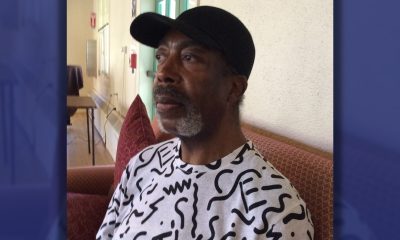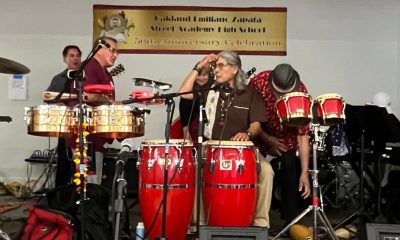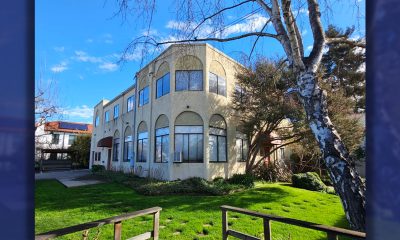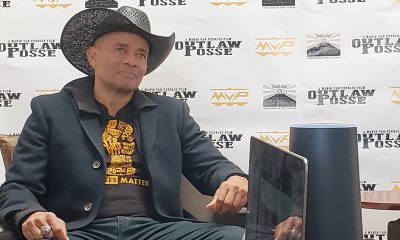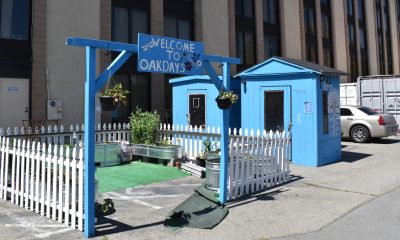City Government
Proposed City Jobs Policy Could Shut Out Black Construction Workers
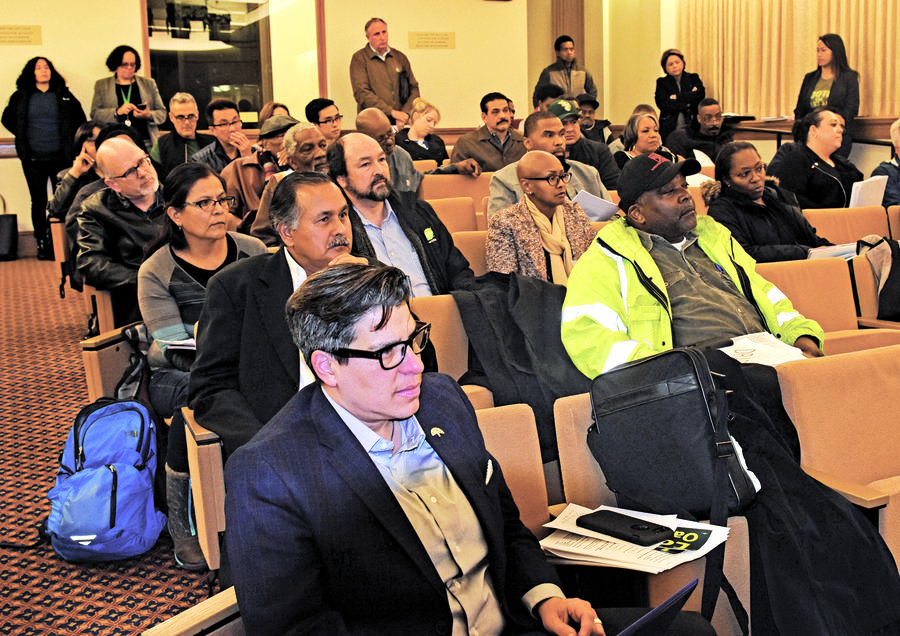
City staff, along with Councilmembers Rebecca Kaplan (front left) and Abel Guillén, hosted a meeting Monday evening at City Hall to hear community feedback on proposed changes for a new labor agreement for development on city-owned lands. Photo by Ken Epstein.
City of Oakland staff held a meeting this week to discuss a proposed public lands policy, which would include a labor agreement with the Alameda County Building Trades Council that some critics fear would undermine the few jobs that exist for African-American construction workers on city-connected projects.
The proposal, as written by Councilmember Abel Guillén, would expand the coverage of the city’s current Local Employment Policy, which at present only applies to subsidized, non-market deals.
If adopted, the policy would apply to all projects involving sale or lease of city-owned land.
The Project Labor Agreement (PLA) between the city and the building trades unions would cover all projects of 80 or more housing units or with an estimated construction cost of $40 million or more.
The proposal would require the Building Trades Council to submit a report to the city within six months after the agreement is signed containing the race, ethnicity, gender and percentage of Oakland residents of each union affiliated with the labor council.
Councilmembers Guillén and Rebecca Kaplan co-sponsored the meeting.
Guillén, who chaired the discussion, explained that he has been working on the public lands policy for over a year. He said the city should strike a balance between selling property for top dollar and requiring public benefits, which would limit the amount of money the city can earn.
“Selling property gets the most money,” he said. “If we want too much, we don’t get the money. [We must] balance a public lands policy with a jobs policy.”
Under the current jobs policy, 88 percent of work on city-connected projects go to union workers, and the balance goes to nonunion or mixed nonunion and union.
Guillén said his proposal would be finalized and sent to the council for discussion and revision. He is suggesting the city pass a policy and then evaluate it after five projects in a few years “to see how we did on local hiring,” he said.
Kaplan emphasized that a new jobs policy should guarantee equity—jobs for Black construction workers and black-owned construction firms, minority workers and for women—and keep money in the local community.
“I appreciate the opportunity to participate in the jobs policy input meeting, and the thoughtful comments and suggestions made by attendees,” Kaplan said in an interview with the Oakland Post.
“I believe we can, and should, work to bring forward jobs policies for public lands that incorporate all of our community, including other issues like ‘ban the box’ as well,” she said. “We also need to continue to work to expand opportunity to get into good-paying jobs in growing construction, including apprenticeship opportunities for Oaklanders.”
Community speakers at the meeting—including representatives of small construction firms—questioned the city’s commitment to equity, based on its past track record.
“How do minority contractors in Oakland get access to contracts, especially on public land? We’re not included. We’re [always] after the fact, and it’s too late,” said Pete Varma, president of the Northern California Chapter of the National Association of Minority Contractors.
“Every time they try out something, Black contractors are left out,” said Louis Summerhill.
“How many Black contractors were involved in putting this [proposal] together?” He asked.
“This isn’t a new conversation. We are the last hired and the first fired, and it hasn’t changed,” said Eddie Dillard.
Several speakers questioned whether a new policy would make a difference if it is not enforced.
The problem with a project labor agreement, according to critics, is that contractors hire workers through hiring halls run by the building trades unions for their members, which are predominately white and have always been segregated.
As a result, African-American construction workers – no matter how experienced – tend not to be union members and have little access to union jobs. Black workers tend to work for non-union, Black-owned small construction firms.
Those job opportunities could be eliminated by a PLA.
The language of Guillén’s proposal allows non-union firms to work on city-associated projects, but “non-union contractors must make first hires from the union hall.”
The firms can then hire a “maximum of five core employees” of their firms, and after that, “All future hires are from the hiring hall.”
As a result, the PLA could mean that almost no Black workers would be able to work on city projects.
Statistics released by the city several years ago show that five percent of construction jobs on city projects went to Black workers. The Oakland Post in October requested current data from the city but has not yet received it.
According to Robyn Hodges, a member of OaklandWorks attended the meeting.
“Oakland is never going to realize equity as along as the Building Trades are writing the rules,” she said. “This plan needs to be tossed out and rewritten, the same way we did with the Army Base Project.
“This needs to become a more open process. If we keep going to the same meetings with the same people, we will be getting the same results.”
Activism
S.F. Black Leaders Rally to Protest, Discuss ‘Epidemic’ of Racial Slurs Against Black Students in SF Public School System
Parents at the meeting spoke of their children as no longer feeling safe in school because of bullying and discrimination. Parents also said that reported incidents such as racial slurs and intimidation are not dealt with to their satisfaction and feel ignored.

By Carla Thomas
San Francisco’s Third Baptist Church hosted a rally and meeting Sunday to discuss hatred toward African American students of the San Francisco Unified School District (SFUSD).
Rev. Amos C. Brown, president of the San Francisco NAACP and pastor of Third Baptist Church, along with leadership from local civil rights groups, the city’s faith-based community and Black community leadership convened at the church.
“There has been an epidemic of racial slurs and mistreatment of Black children in our public schools in the city,” said Brown. “This will not be tolerated.”
According to civil rights advocate Mattie Scott, students from elementary to high school have reported an extraordinary amount of racial slurs directed at them.
“There is a surge of overt racism in the schools, and our children should not be subjected to this,” said Scott. “Students are in school to learn, develop, and grow, not be hated on,” said Scott. “The parents of the children feel they have not received the support necessary to protect their children.”
Attendees were briefed last Friday in a meeting with SFUSD Superintendent Dr. Matt Wayne.
SFUSD states that their policies protect children and they are not at liberty to publicly discuss the issues to protect the children’s privacy.
Parents at the meeting spoke of their children as no longer feeling safe in school because of bullying and discrimination. Parents also said that reported incidents such as racial slurs and intimidation are not dealt with to their satisfaction and feel ignored.
Some parents said they have removed their students from school while other parents and community leaders called on the removal of the SFUSD superintendent, the firing of certain school principals and the need for more supportive school board members.
Community advocates discussed boycotting the schools and creating Freedom Schools led by Black leaders and educators, reassuring parents that their child’s wellbeing and education are the highest priority and youth are not to be disrupted by racism or policies that don’t support them.
Virginia Marshall, chair of the San Francisco NAACP’s education committee, offered encouragement to the parents and students in attendance while also announcing an upcoming May 14 school board meeting to demand accountability over their mistreatment.
“I’m urging anyone that cares about our students to pack the May 14 school board meeting,” said Marshall.
This resource was supported in whole or in part by funding provided by the State of California, administered by the California State Library via California Black Media as part of the Stop the Hate Program. The program is supported by partnership with California Department of Social Services and the California Commission on Asian and Pacific Islander American Affairs as part of the Stop the Hate program. To report a hate incident or hate crime and get support, go to CA vs Hate.
Bay Area
Mayor London Breed: State Awards San Francisco Over $37M for Affordable Housing
On April 30, Mayor London N. Breed announced San Francisco has been awarded more than $37.9 million in funding from the California Department of Housing and Community Development (HCD) as part of the State’s Multifamily Housing Program (MHP). The HCD loan will provide the final funding necessary for development of Casa Adelante – 1515 South Van Ness, a 168-unit affordable housing project located in San Francisco’s Mission District.

By Oakland Post Staff
On April 30, Mayor London N. Breed announced San Francisco has been awarded more than $37.9 million in funding from the California Department of Housing and Community Development (HCD) as part of the State’s Multifamily Housing Program (MHP).
The HCD loan will provide the final funding necessary for development of Casa Adelante – 1515 South Van Ness, a 168-unit affordable housing project located in San Francisco’s Mission District.
The new development at 1515 South Van Ness Ave. will provide 168 affordable homes to low-income families, formerly homeless families, and persons living with HIV earning between 25-80% of the San Francisco Area Median Income (AMI).
In addition, the project is anticipated to provide family-friendly amenities and ground floor community-serving commercial spaces that preserve the prevailing neighborhood character of the Calle 24 Latino Cultural District.
“This funding unlocks our ability to move on building affordable housing units for families in San Francisco at a crucial time. We understand the level of need for more housing that is accessible, and like the state, the city continues to face a challenging budget cycle,” said Breed. “1515 South Van Ness is a good example of what can be achieved in San Francisco when you have strong community partnerships and an unwavering commitment to deliver on critical needs for our residents.”
“From the beginning of my term as Supervisor, I have fought to bring affordable housing to 1515 South Van Ness” said Supervisor Hillary Ronen. “In the interim, the site has been utilized for homeless services and shelter, and I am thrilled that HCD has recognized the value of this development, and we are finally ready to break ground and bring 168 affordable homes to low income and formerly homeless families in the Mission.”
Owned and occupied by McMillan Electric Company until 2015, the City and County of San Francisco purchased 1515 South Van Ness Avenue in June 2019 with the intent of developing new affordable housing.
In November 2020, the San Francisco Mayor’s Office of Housing and Community Development (MOHCD) released a Multi-site Request for Qualifications (RFQ) seeking qualified developers to build affordable housing on the site, and subsequently selected Chinatown Community Development Corporation (CCDC) and Mission Economic Development Agency (MEDA) in May 2021 to develop the site.
The project is expected to begin construction in winter 2025.
“A strong, long-term push by Mission advocates to make this site 100% affordable is now paying off, with 168 family units that include services and childcare. People of color communities know what they need, and we are excited to be in partnership with a team, consisting of MEDA, CCDC, and MOHCD, that listens,” said Malcolm Yeung, Executive Director at CCDC.
“We are excited to be in partnership with CCDC, yet again, and for the opportunity to develop intergenerational affordable housing in the City’s Mission District,” said Luis Granados, executive director at MEDA.
Increasing housing affordable to lower-income and vulnerable residents is a key priority in the City’s Housing Element which calls for additional funding for affordable housing production and preservation, as well as Mayor Breed’s Housing for All Executive Directive that sets out the steps the City will take to meet the bold goal of allowing for 82,000 new homes to be built over the next eight years.
Tuesday’s funding announcement emphasizes the importance of regional and state collaboration in order to reach our housing and climate goals.
“We are thrilled—not just to bring a project of this size to a community with great need — but to do so with community-based developers and their partners who understand the neighborhood and sensitivities around cultural preservation,” said HCD Director Gustavo Velasquez.
City Government
Vallejo Continues to Accept Applications for Boards, Committees and Commissions
The City of Vallejo is requesting applications to serve on a number of the City’s boards and commissions. Vallejo residents who are interested in serving on an advisory body are invited to submit an application and supplemental questionnaire for consideration.
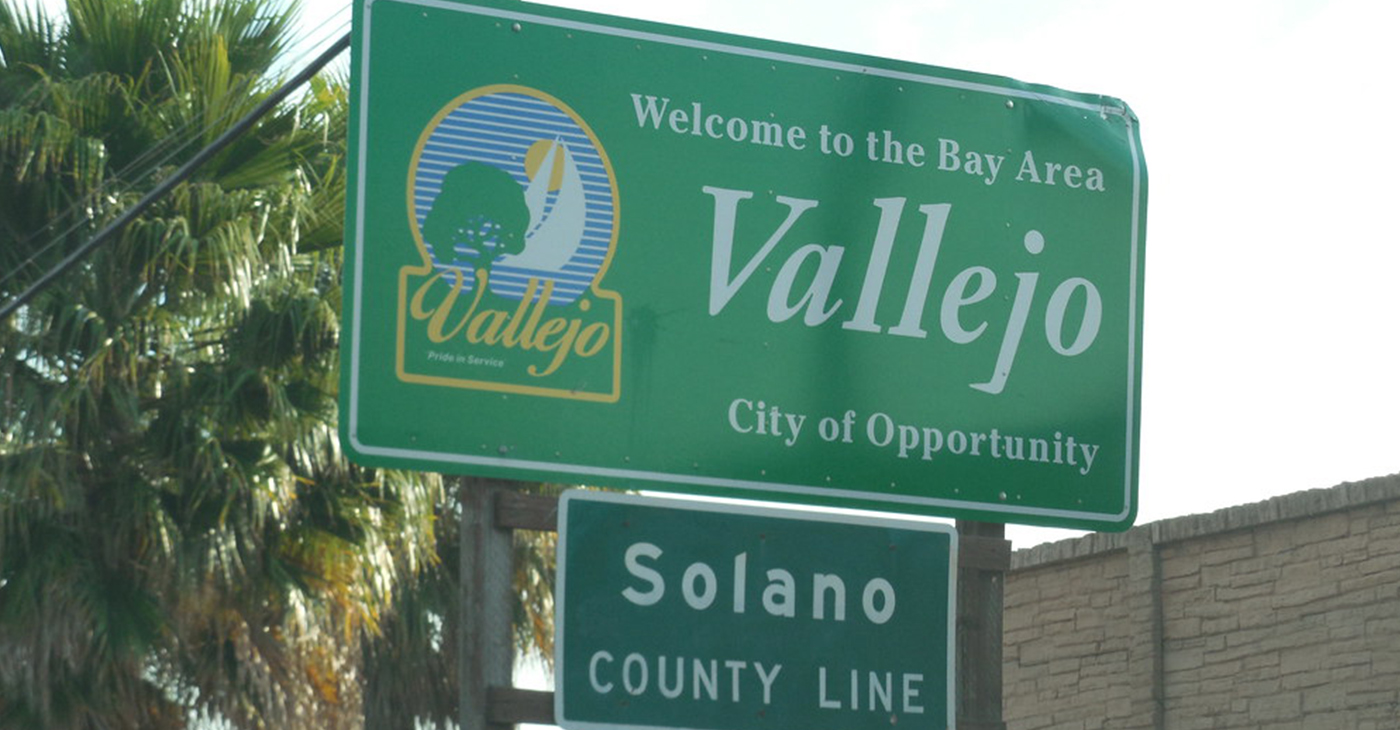
By City of Vallejo
The City of Vallejo is requesting applications to serve on a number of the City’s boards and commissions. Vallejo residents who are interested in serving on an advisory body are invited to submit an application and supplemental questionnaire for consideration.
There are currently openings on the following boards, commissions, and committees:
- Beautification Commission(2) terms expire 6/30/28
- Civil Service Commission(2) terms to expire 6/30/28
- Design Review Board(2) terms to expire 6/30/28
- Housing & Community Development Commission(1) term to expire 6/30/28
- Housing Authority(1) tenant commissioner term to expire 12/31/24
- McCune Collection Commission(3) terms to expire 6/30/28
- Participatory Budget Steering Committee(6 members & 3 alternates) terms expire 6/30/25
- Planning Commission(2) terms to expire 6/30/28
- Surveillance Advisory Board – Districts 1, 2, and 3 Members OnlyDistricts 1 & 3 terms to expire 1/2/25 and District 2 term to expire 1/5/27
- Sister City Commission(1) term to expire 6/30/27
- Solano Commission for Women & Girls(1) Vallejo representative can be youth or adult. Term to expire 4 years from date of appointment
For City Boards and Commissions, except for the Civil Service, McCune Collection, and Sister City Commissions, the Surveillance Advisory Board, and the Participatory Budgeting Steering Committee, all appointed members must complete and file a Statement of Economic Interests, Form 700, within 30 days of appointment.
All City Board and Commission members must complete AB 1234 Ethics training and file a Certificate of Completion within 30 days of appointment.
In most instances, to be eligible for appointment, applicants must be residents of the City of Vallejo. Information regarding the duties of each board and commission and specific criteria for appointment may be found within each application. With some exceptions, appointments are typically for a term of four years.
The application period will remain open until a sufficient number have been received in the City Clerk’s Office
Interviews with the City Council are tentatively scheduled for the evenings of June 3 and 10. Applicants must attend the interview to be considered for appointment on a board or commission.
Application forms and supplemental questionnaires are accessible in several ways:
- The City’s website, located on the Boards and Commissions page
- At City Hall, Office of the City Clerk, 555 Santa Clara Street, 3rd Floor, Vallejo, CA
- By Email at abrahamson@cityofvallejo.net, or by phone at (707) 648-4527
By U.S. Mail: City of Vallejo, C/O City Clerk, PO Box 3068, Vallejo, CA 94590
-

 Community3 weeks ago
Community3 weeks agoFinancial Assistance Bill for Descendants of Enslaved Persons to Help Them Purchase, Own, or Maintain a Home
-

 Activism4 weeks ago
Activism4 weeks agoOakland Post: Week of April 3 – 6, 2024
-

 Business3 weeks ago
Business3 weeks agoV.P. Kamala Harris: Americans With Criminal Records Will Soon Be Eligible for SBA Loans
-

 Activism3 weeks ago
Activism3 weeks agoOakland Post: Week of April 10 – 16, 2024
-

 Community3 weeks ago
Community3 weeks agoAG Bonta Says Oakland School Leaders Should Comply with State Laws to Avoid ‘Disparate Harm’ When Closing or Merging Schools
-

 Community2 weeks ago
Community2 weeks agoOakland WNBA Player to be Inducted Into Hall of Fame
-

 Community2 weeks ago
Community2 weeks agoRichmond Nonprofit Helps Ex-Felons Get Back on Their Feet
-

 Community2 weeks ago
Community2 weeks agoRPAL to Rename Technology Center for Retired Police Captain Arthur Lee Johnson


